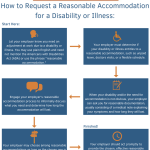How Long Can a Reasonable Accommodation Last?

As we navigate the complex world of employment law and disability rights, it’s essential to understand the concept of reasonable accommodation. Under the Americans with Disabilities Act (ADA), employers are required to provide reasonable accommodations to employees with disabilities, but how long can a reasonable accommodation last? In this article, we’ll dive into the world of reasonable accommodations and explore the answer to this question.
Understanding Reasonable Accommodation
Before we dive into the duration of a reasonable accommodation, let’s define what it means. A reasonable accommodation is a modification or adjustment to the workplace or job requirements that enables an employee with a disability to perform the essential functions of their job. This can include things like:
- Modifying a workspace to make it accessible
- Providing assistive technology or equipment
- Adjusting work schedules or breaks
- Providing a sign language interpreter or translator
- Modifying job duties or responsibilities
How Long Can a Reasonable Accommodation Last? It Depends
Now that we understand what a reasonable accommodation is, let’s talk about how long it can last. The answer is: it depends. The duration of a reasonable accommodation can vary greatly depending on the individual circumstances of the employee and the employer. Here are some factors that can affect the length of time a reasonable accommodation can last:
- The Nature of the Disability: If an employee has a temporary disability, the reasonable accommodation may only be needed for a short period. However, if the employee has a permanent or chronic disability, the accommodation may be needed for a longer period or even indefinitely.
- The Type of Accommodation: Some accommodations, like modifying a workspace, may be a one-time modification, while others, like providing assistive technology or equipment, may require ongoing maintenance or updates.
Temporary vs. Permanent Reasonable Accommodations
Temporary Reasonable Accommodations
Temporary reasonable accommodations are those that are only needed for a short period, usually due to a temporary disability or injury. Examples of temporary reasonable accommodations include:
- Providing a wheelchair or other mobility aid during the recovery period
- Modifying a workspace to accommodate a temporary injury
-
Allowing for temporary work-from-home arrangements
Temporary reasonable accommodations usually have a clear end date, and the employer can plan accordingly. However, the employer must also be prepared to adjust the accommodation if the employee’s needs change or if the accommodation becomes permanent.
Permanent Reasonable Accommodations
Permanent reasonable accommodations are those that are needed for an extended period, often due to a chronic or permanent disability. Examples of permanent reasonable accommodations include:
- Providing assistive technology or equipment, such as a hearing aid or wheelchair
- Modifying a workspace to make it permanently accessible
- Creating a customized workflow or job duties
Permanent reasonable accommodations may require ongoing maintenance or updates, and the employer must ensure that the accommodation is still effective and reasonable.
How Long Can a Reasonable Accommodation Last? In Some Cases, Forever
In some cases, a reasonable accommodation may be needed for the duration of the employee’s employment. For example, an employee with a permanent disability may need ongoing assistive technology or equipment, or modifications to the workspace. In these cases, the employer must ensure that the accommodation is still effective and reasonable, even if the employee’s needs change over time.
Reasonable Accommodations Can Also Be Ended or Modified
While we’ve talked about how long a reasonable accommodation can last, it’s also important to note that an accommodation can be ended or modified. Here are some scenarios where an accommodation may be ended or modified:
- The Employee’s Needs Change: If the employee’s needs change, the accommodation may need to be modified or updated.
- The Accommodation Becomes Unreasonable: If the accommodation becomes unreasonable or creates an undue hardship, the employer may end or modify the accommodation.
- The Employee’s Performance Changes: If the employee’s performance changes, the accommodation may need to be modified or updated.
How Long Can a Reasonable Accommodation Last? It’s a Collaborative Process
Finally, it’s essential to note that the duration of a reasonable accommodation is a collaborative process between the employee and the employer. The employee and the employer should work together to determine the most effective and reasonable accommodation, and to ensure that the accommodation is still effective over time.
Closing: How Long Can a Reasonable Accommodation Last?
In conclusion, the duration of a reasonable accommodation can vary greatly depending on the individual circumstances of the employee and the employer. Whether it’s a temporary or permanent accommodation, the employer must ensure that the accommodation is still effective and reasonable, even if the employee’s needs change over time. By understanding the complexities of reasonable accommodations and working together, employers and employees can create a more inclusive and supportive work environment for everyone.
How Long Can a Reasonable Accommodation Last? It’s a Question with No One-Size-Fits-All Answer
How Long Can a Reasonable Accommodation Last? The Key is Collaboration and Flexibility
How Long Can a Reasonable Accommodation Last? The Answer Lies in the Details
How Long Can a Reasonable Accommodation Last? Every Employee’s Needs are Different
How Long Can a Reasonable Accommodation Last? It’s a Question That Requires Careful Consideration
<